Click here to view past issues
IN THIS ISSUE
- WHA to Host Briefing for Hospitals and Health Systems on Wisconsin’s Application for $1 Billion in Rural Health Transformation Funding
- President Trump Signs Funding Package to Re-Open Government After Longest Shutdown
- WI Assembly Committee on Health, Aging and Long-Term Care Holds Hearing on WHA-Supported Next-of-Kin Legislation as Senate Committee Advances Companion Legislation
- WHA Foundation, Hospitals Connect Local Schools with Grants for Future Health Care Workforce
- Strong Support Expressed for BON’s Work to Create an Expanded Faculty Role for BSNs
- WHA Urges Caution as DHS Embarks on Review of Wisconsin Trauma Designation Standards
- DWD Health Care Sector Grant Funding Opportunity Now Open
- Wisconsin Hospitals State PAC & Conduit Update
- Don’t miss out! WHA Quality and Patient Safety Awards Applications Due Nov. 21
- Effectively Navigating Difficult Conversations & Conflict - Register Today for WHA’s Health Care Leadership Academy
- Hospital Board Education, Keeping Your Board Apprised and Legally Compliant, a Success
- Ascension Awarded WHA 2025 Global Vision Community Partnership Award
- Fast Facts from the WHA Information Center: November is Lung Cancer Awareness Month
EDUCATION EVENTS
Feb. 23, 2026
Nursing Services Conditions of ParticipationFeb. 25, 2026
2026 Advocacy DayMar. 5, 2026
Operational Vacancy: An Effective Tool for Workforce PlanningClick here to view education event calendar
View more issues of The Valued Voice
Sign Up for WHA's Newsletter
WI Assembly Committee on Health, Aging and Long-Term Care Holds Hearing on WHA-Supported Next-of-Kin Legislation as Senate Committee Advances Companion Legislation
State Rep. Pat Snyder (R-Weston) and State Sen. Eric Wimberger (R-Oconto), who authored the legislation along with State Rep. Lisa Subeck (D-Madison), spoke in favor of legislation that they said will help hospitals, patients and their families to better respond to situations where patients are found to lack medical capacity during a hospital stay and need post-acute care.
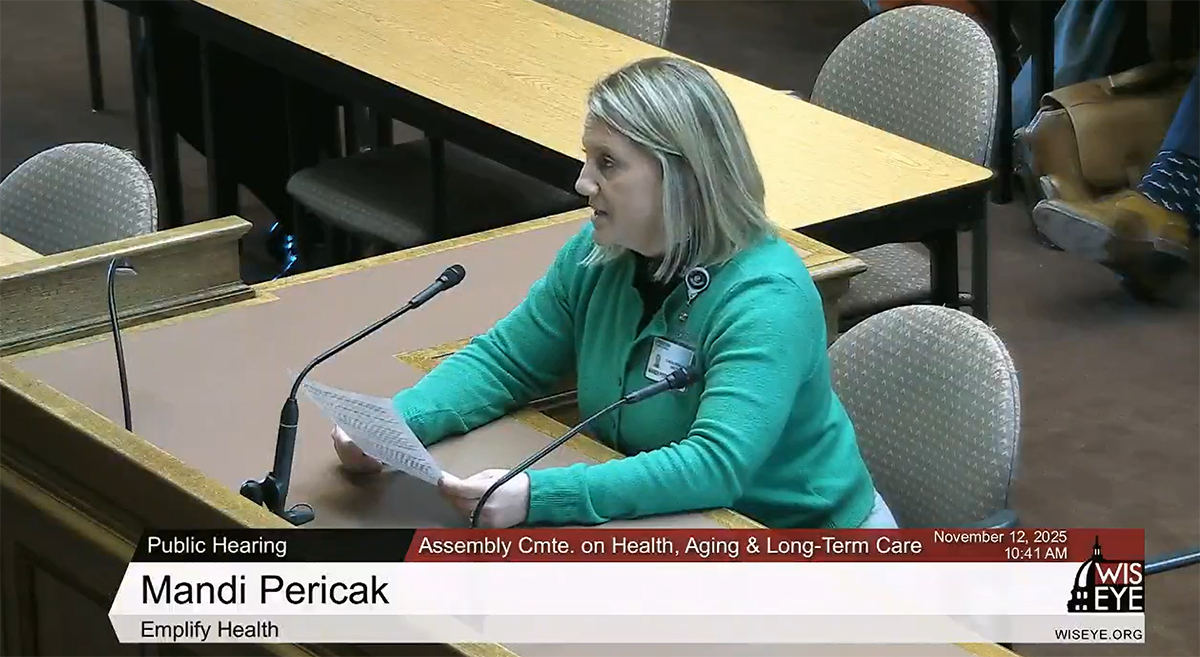 Speaking in favor of the legislation for WHA were Sarah Becker, Wisconsin Social Services Director for Aurora Health Care; Dr. Mandy Pericak, Clinical Operations Director of Post-Acute Care, Social Services, Interpreter Services, Hospice and Advance Care Planning, Gundersen Region at Emplify Health; Gina Von Ruden, Senior Nurse Administrator at Mayo Clinic Health System; Nicki Gritt Franzen, Regional Director of Care Management at SSM Health WI; Joe Hanes, Corporate Counsel at UW Health; Paul David, former Assistant General Counsel at Aspirus Health; and Jon Hoelter, VP Federal Affairs & Advocacy at WHA.
Speaking in favor of the legislation for WHA were Sarah Becker, Wisconsin Social Services Director for Aurora Health Care; Dr. Mandy Pericak, Clinical Operations Director of Post-Acute Care, Social Services, Interpreter Services, Hospice and Advance Care Planning, Gundersen Region at Emplify Health; Gina Von Ruden, Senior Nurse Administrator at Mayo Clinic Health System; Nicki Gritt Franzen, Regional Director of Care Management at SSM Health WI; Joe Hanes, Corporate Counsel at UW Health; Paul David, former Assistant General Counsel at Aspirus Health; and Jon Hoelter, VP Federal Affairs & Advocacy at WHA.
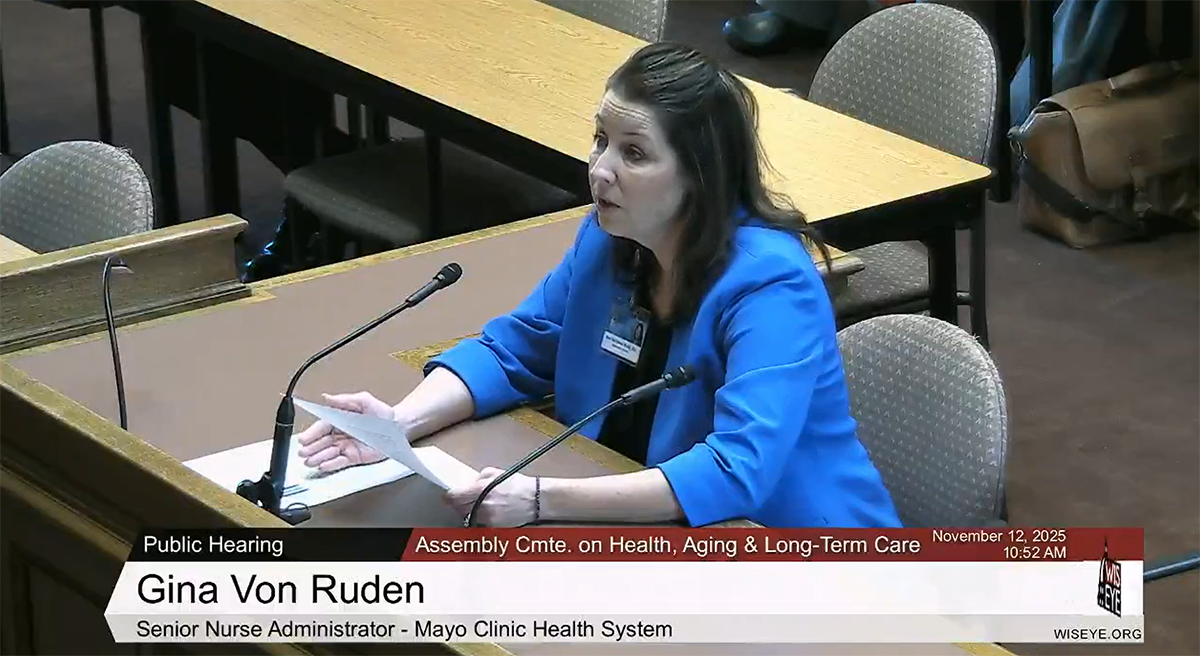 Speaking in opposition of the legislation were representatives from the Board for People with Developmental Disabilities, Disability Rights Wisconsin, the Greater Wisconsin Agency on Aging Resources (GWAAR), the Board on Aging and Long-Term Care and the Wisconsin Counties Association (WCA). Most of their testimony focused on concerns about individual rights and whether the authority of a next-of-kin was too broad, while WCA expressed concerns primarily centered around the requirement for county corporation counsels to maintain and produce records.
Speaking in opposition of the legislation were representatives from the Board for People with Developmental Disabilities, Disability Rights Wisconsin, the Greater Wisconsin Agency on Aging Resources (GWAAR), the Board on Aging and Long-Term Care and the Wisconsin Counties Association (WCA). Most of their testimony focused on concerns about individual rights and whether the authority of a next-of-kin was too broad, while WCA expressed concerns primarily centered around the requirement for county corporation counsels to maintain and produce records.
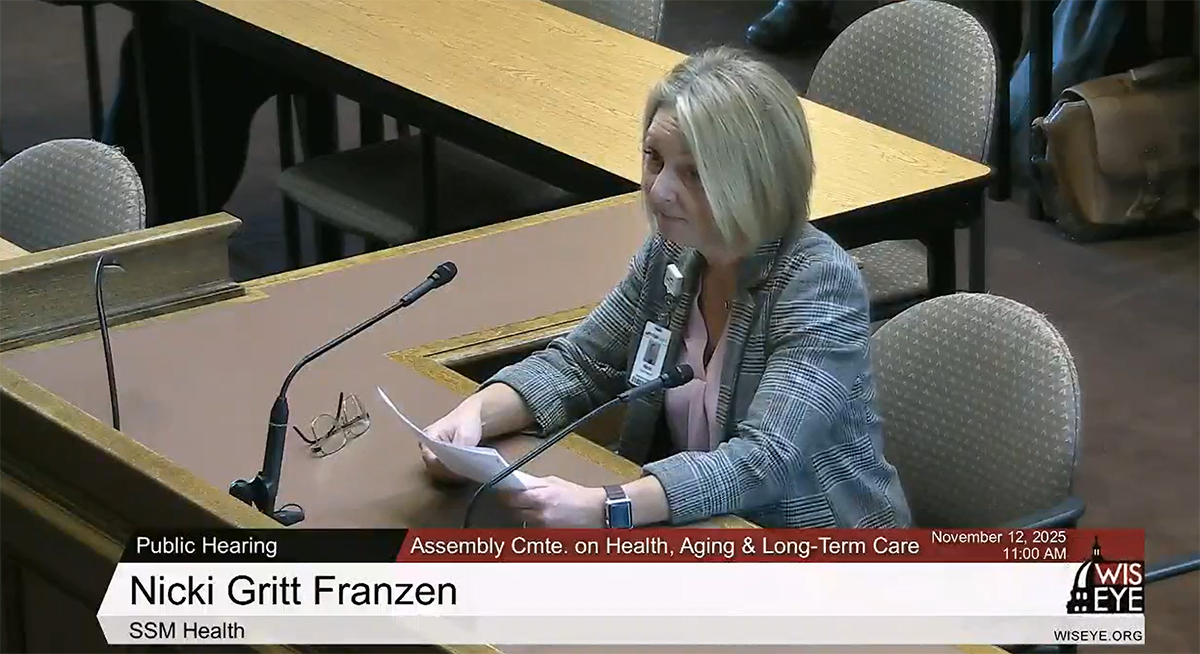 WHA members countered in their testimony that SB 578 is designed to protect the rights of patients and their families to help their loved ones gain access to care in a post-acute setting without the typical delay that ensues due to the current requirement to first seek a guardianship, a process which has become an unnecessary financial and emotional burden for many families in this situation. Additionally, it does not provide the next-of-kin authorities beyond what is already provided to them in the current WI state statute under 50.06 beyond clarifying that the next-of-kin may also assist in applying for Medicaid benefits for their incapacitated family member.
WHA members countered in their testimony that SB 578 is designed to protect the rights of patients and their families to help their loved ones gain access to care in a post-acute setting without the typical delay that ensues due to the current requirement to first seek a guardianship, a process which has become an unnecessary financial and emotional burden for many families in this situation. Additionally, it does not provide the next-of-kin authorities beyond what is already provided to them in the current WI state statute under 50.06 beyond clarifying that the next-of-kin may also assist in applying for Medicaid benefits for their incapacitated family member.
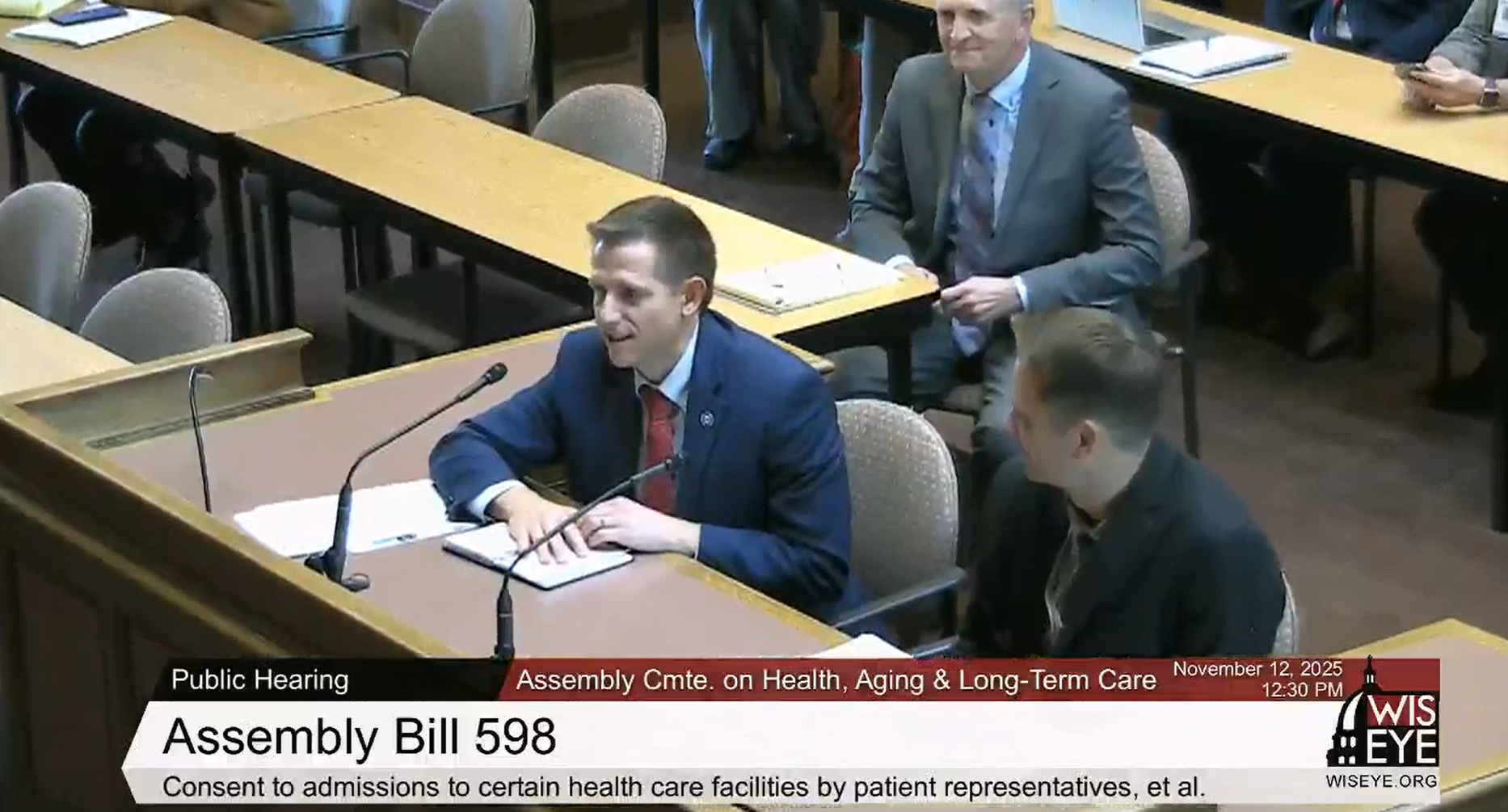 Jon Hoelter, Joe Hanes, Paul David"Assembly Bill 598 creates a legal process that produces the same outcome as guardianship, but without the unnecessary delay and permanent removal of rights that comes with the guardianship process. Importantly, the process that would be created by this bill safeguards patient rights to the same or greater extent as the uncontested guardianship process,” said Joe Hanes, who has worked on many of these cases in his role as Corporate Counsel at UW Health.
Jon Hoelter, Joe Hanes, Paul David"Assembly Bill 598 creates a legal process that produces the same outcome as guardianship, but without the unnecessary delay and permanent removal of rights that comes with the guardianship process. Importantly, the process that would be created by this bill safeguards patient rights to the same or greater extent as the uncontested guardianship process,” said Joe Hanes, who has worked on many of these cases in his role as Corporate Counsel at UW Health.
In addition to the public hearing, the Senate companion legislation (covered in last week's edition of The Valued Voice) was approved by the Senate Committee on Health, Aging, and Long-Term Care by a vote of 4-1, with State Senator Dora Drake being the lone no vote.
The Senate legislation now awaits scheduling for a vote from the full chamber, while the Assembly legislation awaits action by the Assembly committee before it can be considered for a vote by the full State Assembly.
Contact WHA Vice President of Federal Affairs and Advocacy Jon Hoelter with questions.
WI Assembly Committee on Health, Aging and Long-Term Care Holds Hearing on WHA-Supported Next-of-Kin Legislation as Senate Committee Advances Companion Legislation
State Rep. Pat Snyder (R-Weston) and State Sen. Eric Wimberger (R-Oconto), who authored the legislation along with State Rep. Lisa Subeck (D-Madison), spoke in favor of legislation that they said will help hospitals, patients and their families to better respond to situations where patients are found to lack medical capacity during a hospital stay and need post-acute care.
 Speaking in favor of the legislation for WHA were Sarah Becker, Wisconsin Social Services Director for Aurora Health Care; Dr. Mandy Pericak, Clinical Operations Director of Post-Acute Care, Social Services, Interpreter Services, Hospice and Advance Care Planning, Gundersen Region at Emplify Health; Gina Von Ruden, Senior Nurse Administrator at Mayo Clinic Health System; Nicki Gritt Franzen, Regional Director of Care Management at SSM Health WI; Joe Hanes, Corporate Counsel at UW Health; Paul David, former Assistant General Counsel at Aspirus Health; and Jon Hoelter, VP Federal Affairs & Advocacy at WHA.
Speaking in favor of the legislation for WHA were Sarah Becker, Wisconsin Social Services Director for Aurora Health Care; Dr. Mandy Pericak, Clinical Operations Director of Post-Acute Care, Social Services, Interpreter Services, Hospice and Advance Care Planning, Gundersen Region at Emplify Health; Gina Von Ruden, Senior Nurse Administrator at Mayo Clinic Health System; Nicki Gritt Franzen, Regional Director of Care Management at SSM Health WI; Joe Hanes, Corporate Counsel at UW Health; Paul David, former Assistant General Counsel at Aspirus Health; and Jon Hoelter, VP Federal Affairs & Advocacy at WHA.
 Speaking in opposition of the legislation were representatives from the Board for People with Developmental Disabilities, Disability Rights Wisconsin, the Greater Wisconsin Agency on Aging Resources (GWAAR), the Board on Aging and Long-Term Care and the Wisconsin Counties Association (WCA). Most of their testimony focused on concerns about individual rights and whether the authority of a next-of-kin was too broad, while WCA expressed concerns primarily centered around the requirement for county corporation counsels to maintain and produce records.
Speaking in opposition of the legislation were representatives from the Board for People with Developmental Disabilities, Disability Rights Wisconsin, the Greater Wisconsin Agency on Aging Resources (GWAAR), the Board on Aging and Long-Term Care and the Wisconsin Counties Association (WCA). Most of their testimony focused on concerns about individual rights and whether the authority of a next-of-kin was too broad, while WCA expressed concerns primarily centered around the requirement for county corporation counsels to maintain and produce records.
 WHA members countered in their testimony that SB 578 is designed to protect the rights of patients and their families to help their loved ones gain access to care in a post-acute setting without the typical delay that ensues due to the current requirement to first seek a guardianship, a process which has become an unnecessary financial and emotional burden for many families in this situation. Additionally, it does not provide the next-of-kin authorities beyond what is already provided to them in the current WI state statute under 50.06 beyond clarifying that the next-of-kin may also assist in applying for Medicaid benefits for their incapacitated family member.
WHA members countered in their testimony that SB 578 is designed to protect the rights of patients and their families to help their loved ones gain access to care in a post-acute setting without the typical delay that ensues due to the current requirement to first seek a guardianship, a process which has become an unnecessary financial and emotional burden for many families in this situation. Additionally, it does not provide the next-of-kin authorities beyond what is already provided to them in the current WI state statute under 50.06 beyond clarifying that the next-of-kin may also assist in applying for Medicaid benefits for their incapacitated family member.
 Jon Hoelter, Joe Hanes, Paul David"Assembly Bill 598 creates a legal process that produces the same outcome as guardianship, but without the unnecessary delay and permanent removal of rights that comes with the guardianship process. Importantly, the process that would be created by this bill safeguards patient rights to the same or greater extent as the uncontested guardianship process,” said Joe Hanes, who has worked on many of these cases in his role as Corporate Counsel at UW Health.
Jon Hoelter, Joe Hanes, Paul David"Assembly Bill 598 creates a legal process that produces the same outcome as guardianship, but without the unnecessary delay and permanent removal of rights that comes with the guardianship process. Importantly, the process that would be created by this bill safeguards patient rights to the same or greater extent as the uncontested guardianship process,” said Joe Hanes, who has worked on many of these cases in his role as Corporate Counsel at UW Health.
In addition to the public hearing, the Senate companion legislation (covered in last week's edition of The Valued Voice) was approved by the Senate Committee on Health, Aging, and Long-Term Care by a vote of 4-1, with State Senator Dora Drake being the lone no vote.
The Senate legislation now awaits scheduling for a vote from the full chamber, while the Assembly legislation awaits action by the Assembly committee before it can be considered for a vote by the full State Assembly.
Contact WHA Vice President of Federal Affairs and Advocacy Jon Hoelter with questions.
IN THIS ISSUE
- WHA to Host Briefing for Hospitals and Health Systems on Wisconsin’s Application for $1 Billion in Rural Health Transformation Funding
- President Trump Signs Funding Package to Re-Open Government After Longest Shutdown
- WI Assembly Committee on Health, Aging and Long-Term Care Holds Hearing on WHA-Supported Next-of-Kin Legislation as Senate Committee Advances Companion Legislation
- WHA Foundation, Hospitals Connect Local Schools with Grants for Future Health Care Workforce
- Strong Support Expressed for BON’s Work to Create an Expanded Faculty Role for BSNs
- WHA Urges Caution as DHS Embarks on Review of Wisconsin Trauma Designation Standards
- DWD Health Care Sector Grant Funding Opportunity Now Open
- Wisconsin Hospitals State PAC & Conduit Update
- Don’t miss out! WHA Quality and Patient Safety Awards Applications Due Nov. 21
- Effectively Navigating Difficult Conversations & Conflict - Register Today for WHA’s Health Care Leadership Academy
- Hospital Board Education, Keeping Your Board Apprised and Legally Compliant, a Success
- Ascension Awarded WHA 2025 Global Vision Community Partnership Award
- Fast Facts from the WHA Information Center: November is Lung Cancer Awareness Month

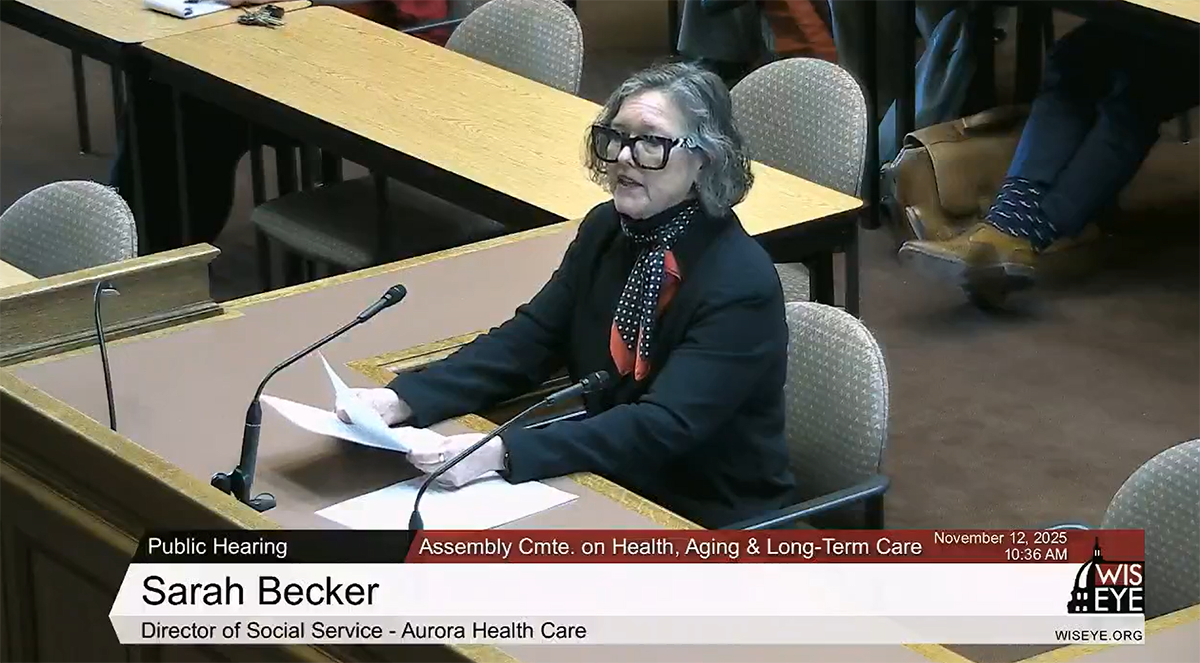 On Nov. 12, the Wisconsin State Assembly Committee on Health, Aging and Long-Term Care held a public hearing on Senate Bill 578,
On Nov. 12, the Wisconsin State Assembly Committee on Health, Aging and Long-Term Care held a public hearing on Senate Bill 578, 